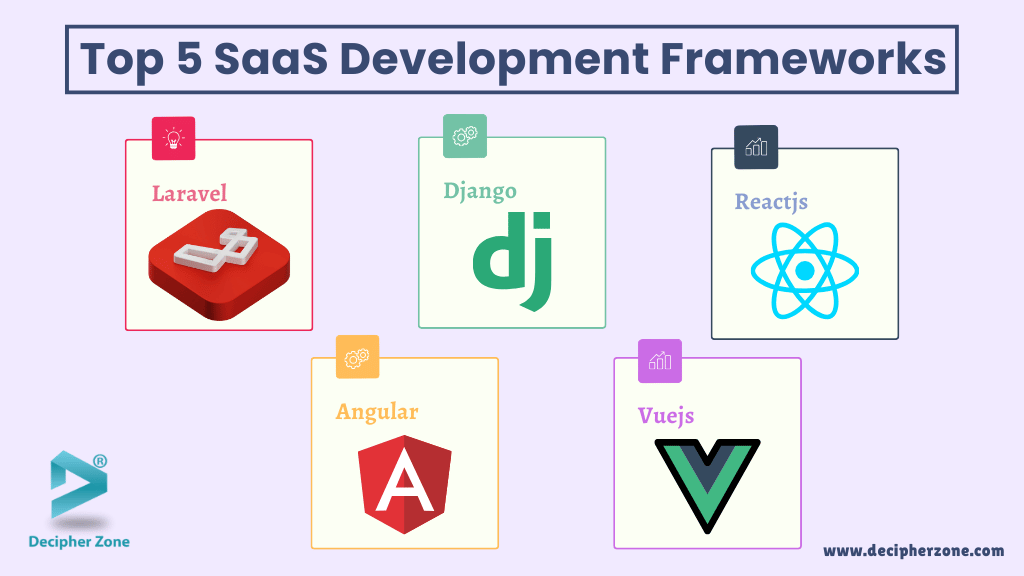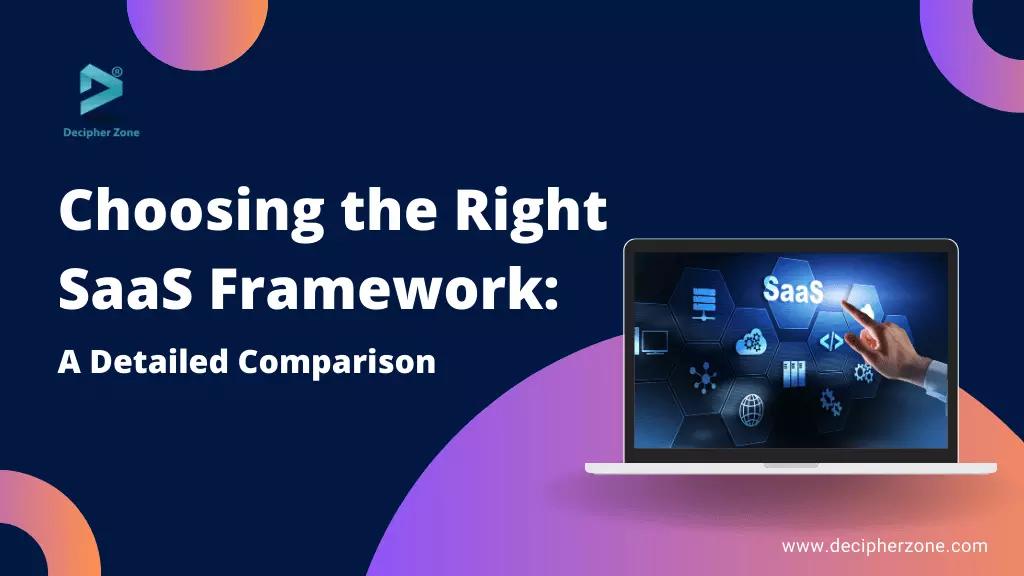Explore the top 5 SaaS frameworks to create reliable, scalable, and intuitive solutions. By delving into this piece, you will gain insight into the best SaaS frameworks that are well-suited for addressing your specific business needs. The article will encompass an in-depth overview of SaaS frameworks, hiring models, and associated costs.
SaaS (Software-as-a-Service) has become the driving force of the software industry, with over 95% of businesses leveraging SaaS applications. This widespread adoption demonstrates the undeniable impact and value of SaaS frameworks in enhancing business operations.
Creating a software as a service (SaaS) application from the ground up is undeniably a challenging endeavor that demands the selection of an optimal framework to ensure the development of a resilient and high-performing SaaS application. Further, you can find the top 5 SaaS frameworks listed to elevate your business productivity and assist you in increasing returns on investment, focusing on your target audience.
Read: SaaS App Development
What Are The Saas Frameworks?
The SaaS framework is an essential set of tools and technologies for developing steadfast and scalable SaaS solutions. It is a crucial component for building successful SaaS solutions. Whether you are an experienced business owner or just starting, utilizing a SaaS framework can assist you in creating robust applications that will impress your users and increase the ROI.
SaaS frameworks offer multiple benefits to businesses, such as helping them construct SaaS applications more effectively and efficiently. By providing a ready-made foundation for development, businesses can save time on coding and focus more on creating high-quality features that will set their products apart from the competition.
Many corporate professionals and small business owners regularly utilize SaaS products, with CRMs, marketing software, and accounting software being some of the most popular types.
Top 5 Development Frameworks for SaaS Applications
As a leading SaaS development company, DZ fully acknowledges the pivotal role of the SaaS framework in creating exceptional solutions for our clients. However, the process of choosing the perfect framework is customized to meet the specific requirements of each project. Here are the top 5 SaaS frameworks to shed light on:

1. Laravel
Laravel is one of the leading PHP SaaS frameworks that offers ready-to-go modules for developers to make easy and lightweight, as well as an extensive range of feature-rich functions to build advanced web applications. Laravel leverages its core framework to support subscription-based billing and multi-tenancy, making it an ideal choice for SaaS solutions.
Features of Laravel SaaS Framework
-
Adaptable and scalable framework
-
Facile to maintain code
-
Artisan CLI
-
Routing system
-
Blade template engine
2. Django
Django, an advanced Python-based web framework, empowers developers to create sophisticated SaaS solutions with agile development and refined, practical design. Its exceptional rapid development and scalability have positioned it as the primary choice for Python developers engaged in SaaS, excelling in both web and Android applications.
From dynamic Content Management Systems to seamless event management platforms and feature-rich web browsers, Django demonstrates unparalleled versatility and efficiency, establishing its prominence across diverse industries, particularly SaaS.
Features of Django SaaS Framework
-
Object-oriented database
-
Secure and scalable
-
Permits customization
-
Access across multiple tenants
3. Reactjs
Reactjs is an open-source SaaS development framework, developed by Facebook. Reactjs delegates developers to effectively organize and reuse code, facilitating the seamless integration of new features and the creation of intuitive user interfaces.
This makes it simpler to integrate with HTML and CSS, while the use of virtual DOM allows for efficient rendering and optimal performance. Using Reactjs allows companies to provide excellent user experience and effectively expand their SaaS products.
Features of ReactJS SaaS Framework
-
Organized component-based architecture
-
JSX syntax for quick integration
-
Virtual DOM for maximal performance
-
Cross-platform mobile development
4. Angular
Angular, a framework developed by Google, is highly regarded for its ability to help developers create robust and scalable SaaS applications. Its distinctive two-way data binding feature simplifies the development process, enabling developers to save time and focus on delivering exceptional user experiences.
Angular offers a seamless development experience, streamlining program compilation and optimizing productivity. Trusted across various industries, Angular is the top choice for businesses that handle high workloads while prioritizing security and delivering visually appealing user interfaces.
Features of Angular SaaS Framework
-
Compatible cross-platform
-
Ample library of components
-
Responsive programming
-
Stackable architecture
-
Inversion of control
5. Vue.js
Vue.js is a popular open-source JavaScript framework that is widely used for building user interfaces and single-page applications (SPAs). It allows developers to create reusable components and efficiently manage state and data flow. One of its standout features is two-way data binding, which simplifies the development process and helps developers save time, enabling them to focus on delivering robust applications.
Read: What is Cloud ERP Software System
Vue.js empowers developers to create complex UI elements and interactive features with ease, making it an ideal choice for SaaS applications that prioritize dynamic and immersive user experiences.
Features of the Vue.js SaaS Framework
-
Reactive data binding
-
Rapid and lightweight performance
-
Improved code organization and reusability
-
Seamless integration
-
Easy maintenance
Hiring Models for SaaS Application Development
Hiring effective people who complement an efficient team is one of the greatest challenges most companies face. Onboarding has emerged as one of the pivotal stages for business growth. Below are some hiring models that will help you secure the best development team suitable to your requirements.
.png)
In-House Development Team
When managing the development process for your SaaS project, having complete control over the process and promoting effective team communication is vital. Whether you choose to hire remote SaaS developers or have an in-house team, each approach comes with its own benefits. Hiring remote SaaS developers allows you to promptly address any pressing issues as they arise while hiring an in-house team ensures that employees can fully dedicate their working hours to your product.
With an in-house development team, you can create development playbooks, securely manage confidential data, and maintain full control over every aspect of the development process.
Read: Cloud-Based Software Development
Freelance Developers
When looking for freelance full-stack developers, it's essential to consider their experience in creating Software-as-a-Service (SaaS) frameworks using a diverse range of technology stacks. Many freelance networks have in place a rigorous vetting process, which typically involves skills tests and interviews, to ensure that they pre-select highly qualified candidates.
This thorough screening process simplifies the task of finding the right talent for your SaaS development team and keeps the momentum going in moving your projects forward.
Outsourced Development Agency
Outsourcing to a software development company offers numerous advantages, incorporating the strengths of diverse hiring models while minimizing potential risks. These agencies furnish dedicated development teams to businesses globally, enabling the realization of any technological concept, irrespective of its complexity or the scale of the project.
Cost of SaaS Framework Development
Developing a new Software as a Service (SaaS) application involves an average cost ranging from $15,000 to $500,000. This cost estimate is derived from the need to engage a SaaS development agency for a duration of 6 to 12 months, which is deemed as the optimal timeframe for the launch of a minimum viable product.
It's important to note that the cost of developing SaaS applications can increase significantly if the development agency lacks expertise in Minimum Viable Product (MVP) strategy or if the development process is prolonged. Moreover, when using an in-house team, the expenses are higher due to the necessity of providing full-time employee benefits.
Choose Decipher Zone for Intuitive/Top-Notch SaaS Framework Development
When it comes to building successful SaaS applications, selecting the right SaaS framework is of utmost importance. With a suitable framework and an experienced development team, you can craft a scalable, reliable, and cost-effective SaaS solution that is tailored to meet your specific needs and propels business growth.
Read: Angular vs React
Amid the multitude of options available in the market, Decipher Zone stands out with a decade of experience in creating robust and scalable SaaS solutions. This makes us an excellent choice for businesses in search of seasoned professionals to turn their vision into reality.
FAQs
-
What are the most popular SaaS frameworks for creating scalable applications?
Some of the most widely used SaaS (Software as a Service) development frameworks encompass Laravel, Django, ReactJS, Angular, and Vuejs. These robust frameworks offer a comprehensive set of tools and feature-laden functions, empowering developers to construct dependable and scalable SaaS products with efficiency and effectiveness.
-
What is the ideal SaaS development method for established companies?
When starting a new SaaS project, you have the option to build an in-house team, enlist freelancers, or hire an outsourced development agency. Each method has its benefits, but the best choice depends on your budget and specific requirements.
-
What is the ideal SaaS development method for fledgling businesses?
When deciding between hiring an in-house team or a product agency for your startup, consider your funding and management experience. If you have significant funding, it may be practical to hire an in-house team. However, if you're bootstrapping, it's advisable to engage a product agency to assist with idea validation, development, and ongoing improvement.

